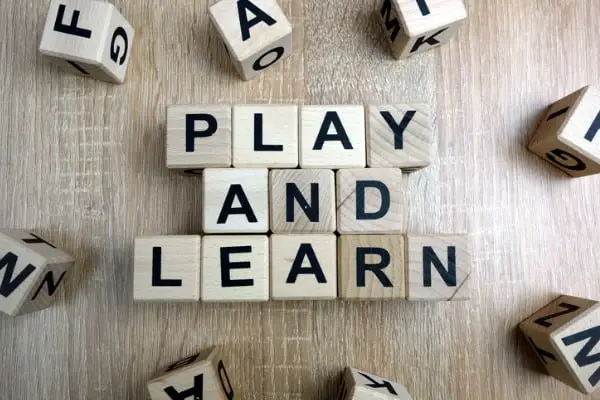
One of the best ways to improve children's vocabulary is through word games. There are a few different types of word games that children can play, but they all have one thing in common: children will be engaged in playing and learning at the same time!
In this article, you'll learn four fun word games that will help children learn while having a great time.
Quick Navigation
1. Scrabble
Scrabble is an intense word game that children can play. One of the most popular ways to learn vocabulary is through crossword puzzles, and Scrabble is just like a giant puzzle in which players create words by using letters on their personal board.
It’s one of those games where you either love or hate it because chances are your kids will be highly frustrated when they try to spell out words such as “defenestration” while still mastering common ones like “cat.”
This way, children not only have fun with the game but also improve their vocabulary skills. Motivate them to play daily because children who play the game for five minutes a day will improve their vocabulary by up to 70%.
The children’s dictionary is also an important resource, as they may not know that “defenestration” means “the act of throwing someone or something out a window.” Scrabble is one way children can learn while having fun. Sometimes, your kid might get stuck on some words, and that's no problem. While they are learning they can use a word finder by visiting wordgiraffe.com where they'll have an easier time getting to know a certain word.
This way, they'll learn faster and they will know the word every time after that.
Here is a list of reasons why your kid should definitely try Scrabble or any other crossword puzzle:
- increases their vocabulary
- they'll learn to think better
- they'll have an easier time learning new words
- children can play with a parent
- they'll learn to spell better
- faster reading
- faster writing
2. Bananagrams
This game is a lot of fun for children and adults alike. Everyone looking for a way to spend some quality time with their children while also exercising their minds at the same time should try out Bananagrams.
In this game, players take turns building words on an ever-growing grid from letter tiles that they draw one by one out of a bag. The goal is to use all your tiles before any other player runs out (or uses up) theirs.
Although spelling isn't important in Bananagrams as long as you make sure each word contains at least six letters, there are still strategies involved like being able to spell across or down which can help win the game if it comes close enough!
Bananagrams can be played competitively or cooperatively and children can play with adults or other children. It's perfect for bonding, as well as learning because children can learn new words, and kids who already know the meaning of a word can help others who might not be able to read yet.
Bananagrams are also eco-friendly because there's no packaging to throw away, just peel off the banana sticker on one side of each tile and you're ready to play! These games come with an instruction booklet that contains many variations so if your child becomes bored with this game or wants something different, they have plenty of options.
3. Hangman

This pretty ancient game is still popular because children enjoy it. It's one of the few word games that children can play without help from an adult and is a good way for children to learn vocabulary as they identify words, spelling, exceptions with consonant-vowel pairings, prefixes, and suffixes.
There're many variations on this game, but some are: “Word Hangman,” “Hangman Tic Tac Toe” where children work in pairs or teams against each other (instead of playing solitaire), and “Cover Up Hangman.”
The object of these versions is to find all the letters before guessing incorrectly three times or less. In addition to teaching children about vocabulary, there are also math skills involved because players have to figure out what letters need filling in and use their sense of logic to deduce what letters are in the word.
There's also a children's board game called “Hangman” which is similar to Scrabble or Boggle, where players race against each other to form words from letter tiles on a grid.
This board game has no educational value but children enjoy playing it! Hangman is one of the most popular games for children because they can play with friends without assistance (though adults may need help in determining if someone wins).
Some teachers have found that children who engage more actively through vocabulary-centered activities like these will perform better academically than those who do not. It might be worth looking into how you could incorporate hangman into your child's lessons or activities.
4. Apples to Apples Jr.
Another fun game is Apples to Apples Jr. which is a children's version of the original game, Apples to Apples. In contrast with its namesake, it has a simpler vocabulary and requires children to be able to read English fluently for it all makes sense for them.
The goal of this word game is similar as well. Each player plays their card(s) face down on the table while trying not to let other players see what they have played. Then turns them over at the same time revealing who “won” that round by playing a word most like or related to (or simply an adjective).
In addition, there are two special cards: a purple wildcard, which can replace any letter on your turn but does not point towards any word, and an orange question card which prompts children to come up with a related phrase or sentence.
Additionally, there are three ways in which the game can be played: children either take turns playing cards one at a time until all of their face-down cards have been turned over.
Children play multiple rounds each taking an initial turn before passing on subsequent turns, children see how many points they can accumulate by hearing vocabulary words from other players' sentences (through wildcards) or reading them off of prompt cards.
Scrabble, Bananagrams, Hangman, and Apples to Apples Jr. are all examples of how a simple game can lead to hours of fun with family or friends.
There's nothing better than playing games when you're not trying your best at the game itself! If you haven't tried any of these games before, you should go find one that sounds interesting and give it a shot.
You won't regret spending some quality time together as a family by sharing in an activity like this, and your kids will be learning at the same time!
